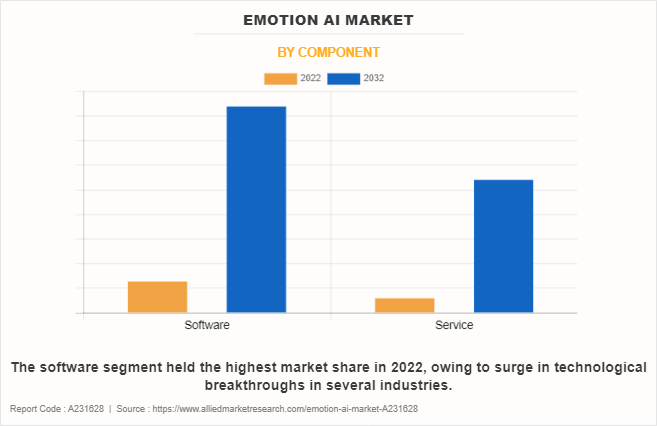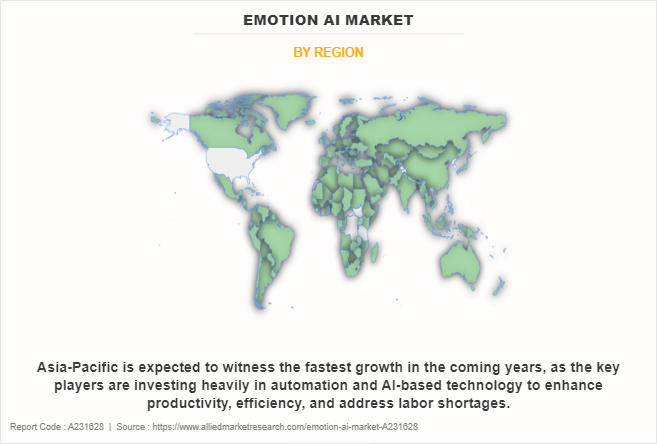Emotion AI Market Statistics, 2032
The global emotion AI market was valued at $1.8 billion in 2022, and is projected to reach $13.8 billion by 2032, growing at a CAGR of 22.7% from 2023 to 2032.
Substantial growth in AI and ML technologies and the increase in adoption of biometrics and facial recognition positively impact the growth of the emotion AI market forecast. In addition, surge in the usage of emotion detection solutions in several industries is driving global market growth. However, The high cost of application and development, and data storage and management hamper market growth. Furthermore, integration in IoT-based technologies and expansion of wearable devices in various applications creates opportunities for emotion AI industry.

Emotion AI is a subtype of artificial intelligence (AI) that studies, responds to, and propagates human emotions. It is often referred to as affective AI or affective computing. It focuses on natural language processing (NLP), sentiment analysis, voice emotion AI, and facial movement analysis, emotion AI interprets human emotional responses from sources including text, audio and video. In addition, A technology called sentiment analysis is occasionally employed in fields like marketing, where it's used to product review analysis and suggestion tailoring, and finance, where it may be used to predict stock movement.
AI-powered solutions have the capacity to continually monitor networks, endpoints, and systems, allowing for quick reaction and real-time visibility into any situation. This further leads to more accurate and effective business operations. In addition, the increase in demand for behavioral analysis in several industries further contributes to driving growth of the emotion artificial intelligence market. The AI systems are more trained, that further reduced the chances of false positives by improving accuracy of the emotion detection solutions. Such enhanced factors are expected to provide lucrative opportunities for emotion AI market trends during the forecast period.
In addition, emotion AI solutions are also set to influence industries like healthcare, insurance, education and transportation, which are further expected to contribute to the growth of emotion artificial intelligence market. Moreover, the surge in usage of internet devices in various applications and rising amount of data generated by these internet devices creates lucrative opportunities for the global emotion AI market. Moreover, growing demand for flexible emotion recognition services across businesses is expected to fuel the growth of the market during the forecast period. Furthermore, the rise in visualization tools for security data is also arising, which further is expected to provide lucrative growth opportunities for the market in the forecast period.
Segment Review
The emotion AI market is segmented into components, enterprise size, application and region. On the basis of component, it is bifurcated into software and service. By enterprise size, it is divided into large enterprise and small and medium-sized enterprises. By application, it is categorized into BFSI, healthcare, IT & telecommunication, retail and e-commerce, government, media and entertainment, automotive, and others. Region wise, it is analyzed across North America, Europe, Asia-Pacific, and LAMEA.

On the basis of component, the global emotion AI market share was dominated by the software segment in 2022 and is expected to maintain its dominance in the upcoming years, owing to the surge in technological breakthroughs in several industries has proliferated numerous opportunities for the software segment in the market. However, the service segment is expected to exhibit the highest growth during the forecast period. As emotion AI services are increasingly implemented in various industries.

By region, North America dominated the emotion AI marke share in 2022. The region has a strong foothold for numerous large enterprises, and government organizations with a huge focus on data safety and compliance are anticipated to propel the growth of the Emotion AI market. However, Asia-Pacific is expected to exhibit the highest growth during the forecast period. The region is experiencing an increasing number of cyberattack incidents across various industries, including healthcare, finance, government, and telecommunications, which is expected to provide lucrative growth opportunities for the market in this region.
Top Impacting Factors
Substantial growth in AI and ML technologies:
Increasing adoption of AI and ML technologies in several sectors has proliferated the demand for emotion AI solutions. The integration between digital solutions and AI/ML has improved the capabilities of industries, allowing them to perform more complicated tasks, make intelligent decisions, and adapt to evolving environments. AI and ML algorithms empower businesses with advanced perception and decision-making capabilities. In addition, emotion AI can navigate dynamic environments, classify human reactions, and respond to unstructured instances, leading to greater autonomy and adaptability. Thus, such factors are expected to propel numerous opportunities for the global market.
Moreover, leveraging the automation trends and use of smart data in emotional AI technology could lead to improving production quality. Thus, the technological breakthrough in the development of autonomous infrastructure led to a surge in demand for emotion detection to improve process optimization. These factors are expected to propel market growth. Hence, several companies and government authorities are leveraging advanced technologies intending to improve efficient operations. For instance, in September 2023, AB Tasty launched EmotionsAI. This new technology enables customers to use AI-based audience segmentation based on their emotional needs; a unique product that helps brands personalize to customers on an emotional level. These technical developments in improved emotion detection solutions will significantly pave numerous opportunities for market growth.
The increase in adoption of biometrics and facial recognition:
The outbreak of COVID-19 prompted a considerable proportion of routine activities and businesses to shift their operations online. This resulted in organizations and individuals throughout the world beginning to rely more increasingly on digital media and communication networks. This further propelled the adoption of biometrics and facial recognition around the globe. The process of recognizing or validating a person's identification by their facial traits is known as facial recognition. It captures, examines, and compares patterns based on the person's facial details. Biometric authentication is becoming increasingly ubiquitous across various industries and applications, providing a safe and efficient means of digital identity verification. Such factors further increase the awareness about emotion detection solutions, which in turn contribute to accelerating the growth of the global market.
In addition, the supportive government policies and increasing investment by public and private authorities in emotion AI solutions are positively impacting market growth. Governments around the globe are recognizing the importance of biometrics and facial recognition in the digital age and integrating proactive measures to safeguard end-users and businesses. Further, government policies are undertaking increased initiatives to embrace advanced technology, with plans for integrating new digital solutions. For instance, in July 2023, U.S. Citizenship and Immigration Services (USCIS) launched a new self-service tool allowing benefit requestors, and their attorneys and accredited representatives, to reschedule most biometric services appointments before the date of the appointment. Therefore, emotion AI gained wider traction among end-users, which in turn, is expected to fuel robust emotion AI market growth.
COVID-19 Impact Analysis
The effects of the COVID-19 crisis on the global economy will reduce the growth of the emotion AI market in the short run, owing to the using a mask for social contact has become necessary and unsettling emotional awareness in daily life. Furthermore, it lowers the likelihood of discovery since under mask conditions, sunglasses, and uncovered situations, the rate of recognition are lowest. On the other hand, several key segments in the market, particularly the healthcare sector, have demonstrated exponential growth for vendors in the long term. In the long-run outlook, the market witnessed a significant upturn, owing to the continued surge in demand for emotion detection solutions in different industry verticals, especially the surveillance and healthcare sector, in the wake of a pandemic.
Further, post-COVID-19 situation, companies are also focusing on emerging technology such as cloud computing technology, IoT, and AI-powered solutions, among others, to perform contactless operations safely and securely. This factor creates demand for emotion AI solutions, thus accelerating the market growth. Moreover, organizations increased their focus on greater product visibility, efficiency, and resilience as a part of their top priorities. Additionally, the rise in usage of facial recognition solutions is due to the continued surge in automation trends and escalating use of digital services in the software industry to make predictive and prescriptive decisions during the COVID-19 pandemic. As a result, the rise in digital transformation initiatives in emotion AI market demand for emotion detection and recognition solutions worldwide.
Key Benefits for Stakeholders
- The study provides an in-depth emotion AI market analysis along with the current trends and future estimations to elucidate the imminent investment pockets.
- Information about key drivers, restraints, and opportunities and their impact analysis on the emotion AI market size is provided in the report.
- The Porter’s five forces analysis illustrates the potency of buyers and suppliers operating in the emotion AI industry.
- The quantitative analysis of the global emotion AI market for the period 2022–2032 is provided to determine the Emotion AI market potential.
Emotion AI Market Report Highlights
| Aspects | Details |
| Market Size By 2032 | USD 13.8 billion |
| Growth Rate | CAGR of 22.7% |
| Forecast period | 2022 - 2032 |
| Report Pages | 257 |
| By Component |
|
| By Enterprise Size |
|
| By Application |
|
| By Region |
|
| Key Market Players | Realeyes, Microsoft Corporation, Cipia Vision Ltd., Affectiva, NuraLogix Corporation, Apple, Inc., Cogito Corporation, IBM Corporation, Emotibot, NVISO |
Analyst Review
As the emotion AI market continues to evolve, CXOs are evaluating the opportunities and challenges regarding this emerging technology. Businesses acknowledge the significance of automating the several tasks that occurred in various industries, especially in industries such as manufacturing, healthcare, and automotive. Businesses are considering the benefits that emotion AI solutions and services can offer, including the capability to streamline user testing, consumer surveys and focus groups, to glean insights from consumer reactions to advertisement campaigns, prototypes, and mockups. In addition, implementing effective emotion AI solutions helps businesses to maintain the privacy and authenticity of data, safeguarding their enterprise reputation and avoiding potential legal and financial consequences. Such factors are expected to provide lucrative opportunities for market growth during the forecast period.
Furthermore, emotion AI may be used to analyze news articles or internet conversations to determine if the general message is favorable or negative. However, businesses also recognize the challenges associated with emotion AI solutions. One potential risk is the complexity and usability challenges. This type of software is complicated to deploy and use, that may require technical knowledge and additional processes to encrypt and decrypt data, which can make it challenging for organizations to enhance their product offerings in security services. In addition, emotion AI solutions require significant investment in infrastructure and technological expenses, which can be a major restraint for the global market.
Furthermore, interoperability issues between the network of devices must be addressed as there could be incompatibilities between the regulatory standards and protocols used by various AI solutions. Businesses must integrate software or applications based on specific standards and protocols. By addressing these challenges, businesses can unlock the full potential of emotion AI solutions to transform their business operations, create value, and gain a competitive advantage in their industry. For instance, in September 2023, Affectiva launched a new attention metric in its cloud-based Emotion AI offering. This metric, bolstered by Smart Eye's advanced automotive safety-grade eye tracking technology, represents a significant leap in viewer attention measurement for brands, advertisers, entertainment companies, and their market researchers.
Substantial growth in AI and ML technologies and the increase in adoption of biometrics and facial recognition positively impact the growth of the market in the future.
North America is the largest market for the Emotion AI.
Emotion AI Market is expected to reach $13,766.55 Million, by 2032.
The key growth strategies for Emotion AI include product portfolio expansion, acquisition, partnership, merger, and others.
IBM Corporation, Microsoft Corporation, Cogito Corporation, Eyesight Technologies, Corporation, Realeyes, NVISO, Emotibot and others
Loading Table Of Content...
Loading Research Methodology...


